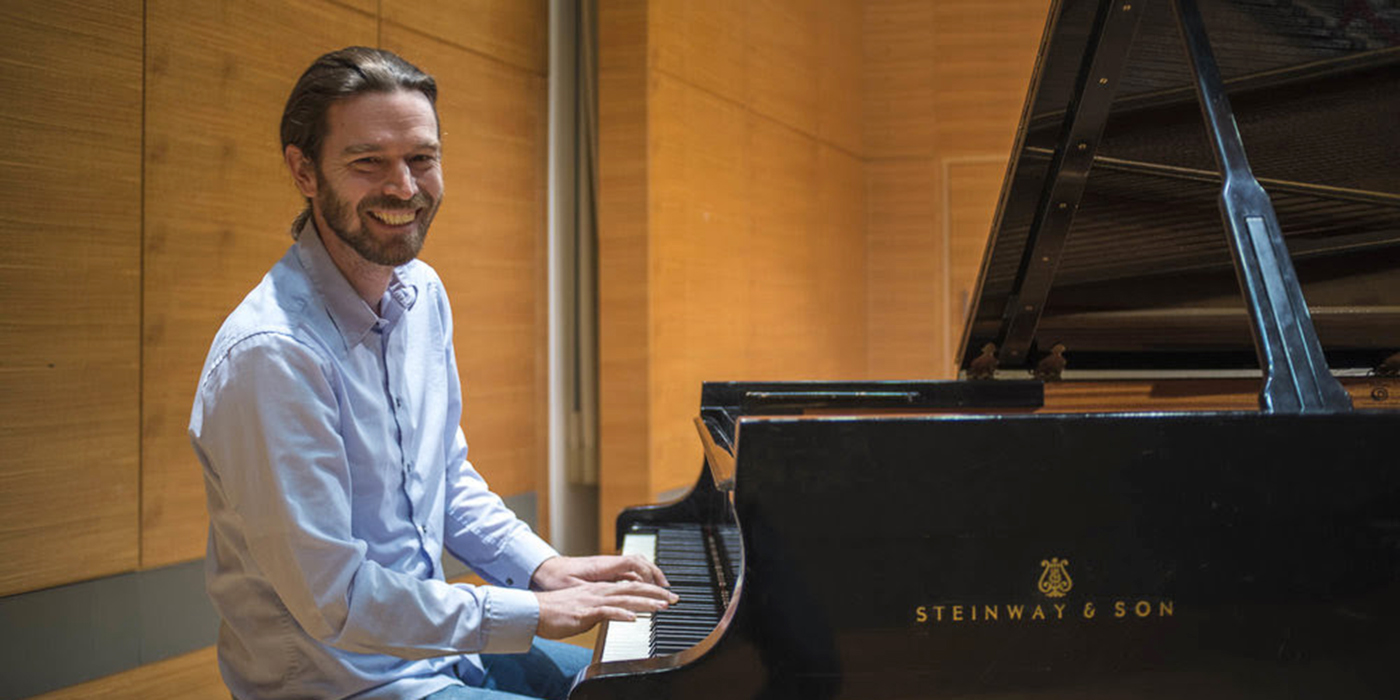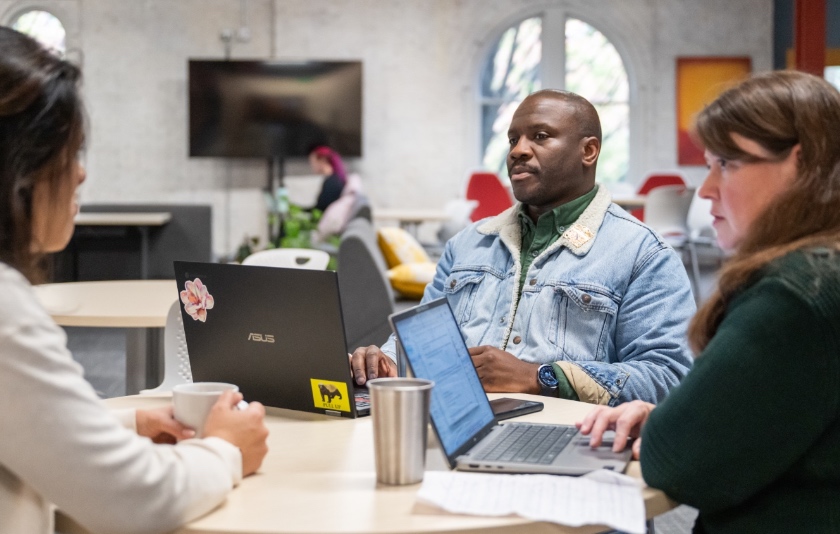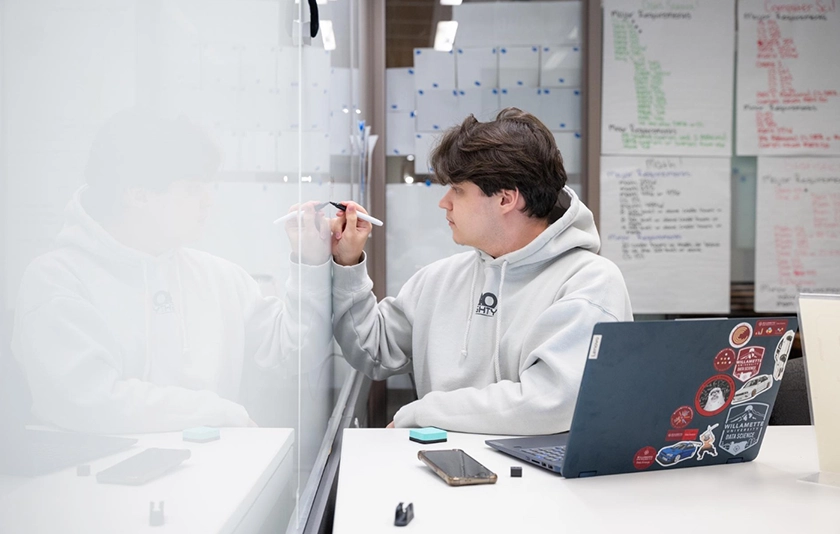For a student who never planned on majoring in music at Willamette University, Ian Scarfe’s career has taken a delightfully different path.
Scarfe ’05 is primarily a pianist whose many roles — faculty member, guest artist, concert host, ensemble founder — launched him to prominence in the world of classical music. But he’s perhaps better known to the greater world as the founder of a music festival.
For the past decade, Scarfe has arranged over 400 events, from large concerts to house parties and children’s shows, through the Trinity Alps Chamber Music Festival, a wilderness retreat and touring arts festival he co-founded with violinist Ellen McGehee ’04 in California.
His career could have diverged had it not been for Willamette’s faculty and an education that suited his broad range of interests. “The encouragement of the faculty and the music department helped me choose to become a musician,” he said.
Defining his potential
Oregon’s natural beauty was a welcome sight to Scarfe, who hails from rural Texas, and the university’s size and personalized attention to students appealed to him.
The idea of a music career first occurred to him his first year, when he sought piano lessons after classes and course loads had been settled. Professor Emerita Anita King and artist-in-residence Jean-David Cohen offered to hear him play anyway, then suggested he apply for a music scholarship.
It was a light bulb moment, he said. Piano, singing and theatre had always been a part of his life, but he never considered it a valid career choice. And Willamette’s music program balanced a collegial atmosphere with faculty who prioritize student needs.
On his first day of advanced music analysis with Professor Emeritus Daniel Rouslin his senior year, Scarfe was the only student who showed up — the other student dropped out — so Rouslin tossed out the syllabus and started anew.
Rouslin offered to split the class responsibilities with Scarfe: He would choose music to teach for half the course, Scarfe could select music for the other half.
“In retrospect, I realize he was setting me up to be his colleague,” Scarfe said, adding they’ve worked with each other several times since through the Trinity festival. “He was breaking down the barrier between teacher and student. Why aren’t we both teachers? Why aren’t we both students?”
During his undergraduate career, Scarfe joined the Chamber Choir led by former Director Wallace Long, the Willamette Master Chorus led by organist Paul Klemme and he began to accompany other students for vocal and instrumental performances or recitals. Scarfe stayed on as a staff accompanist for the music department a year after he graduated, realizing “the best way to make a career was to embrace the collaborative side of being a musician,” he said.
A different league
In 2006, Scarfe enrolled at the San Francisco Conservatory of Music, one of the most respected conservatories nationwide.
Given the intense competition and elevated focus of a conservatory — with more emphasis on networking, generating professional jobs and identifying how to fit into the industry — he was glad he studied music at Willamette. He wasn’t ready for a conservatory at age 18, he said.
“After I graduated, I had a lot more self-confidence and felt a lot more committed to the career aspect of it,” he said. “A conservatory is an entirely different league.”
The conservatory also introduced him to yet another league, one he never dreamed of being associated with — the National Football League.
At the time, the San Francisco Conservatory accepted requests from anyone who needed a professional musician, from engaged couples who wanted wedding music to the restaurant director at Candlestick Park, the old 49ers stadium, he said.
No sound system existed in the building, so the restaurant added a piano to entertain the large crowds before the home games. For five years, he had the grueling yet highly-paid job of being “starting pianist for the 49ers,” playing seven hours every game day with long stretches of required breaks and nowhere to go for privacy. “I was sonic wallpaper,” he said, “but there was a certain glamour to it and I’d still do it if they hired me again.”
Creating common ground
But as Scarfe performed at the football games and maintained a steady roster of other collaborations, he started developing a much larger project.
After he moved to San Francisco for grad school, he sought refuge from the big city by visiting McGehee’s farm in the Trinity Alps region, a California treasure marked by alpine lakes and chiseled granite peaks. McGehee loved living near the mountains but missed playing music; Scarfe played in the city but missed the outdoors. The chamber music festival was born.
Surrounded by vast wilderness, with no cell service or traffic, musicians gather for a week at the farm to kick back, rehearse and grow their own food. In the following weeks, they travel around California and Oregon to give free concerts. As the years passed and the festival expanded, adding more performances, school tours and family concerts, it became one of the most prominent classical chamber music festivals in the region. The most recent live festival in 2019 featured 20 musicians and 13 performances in Oregon, California and Florida.
When the pandemic shut down concerts, he shifted the festival online to great success: Hundreds have tuned in to the nearly two dozen digital concerts he’s held so far, featuring 42 different performers in the U.S. and Europe. The next concert will feature the Sierra Quartet April 30, and in-person events will be scheduled for Northern California and Oregon this summer.
Keeping music accessible during the pandemic was important to him, but accessibility has always been part of his mission. The cover of his upcoming album with violinist Philip Brezina, “California Classical,” is a good example: Rather than feature the duo performing in tuxedos, they clutch surfboards instead, barefoot as they walk along the coast with the Golden Gate Bridge in the background.
Classical music can be off-putting, appearing to some as a genre meant only for the rich or the elite, but that approach serves no one — not the industry or the musician trying to make a living, he said.
“Music is music, and once you get people comfortable and into their chairs, you can just make it a human experience,” he said. “Classical music is really for everyone.”




